Overview

Inflammatory bowel disease is a general term used to describe a range of gut and digestive health problems. These health problems are chronic disorders that involve inflammation of the digestive tract.
The two main conditions that are called inflammatory bowel disease are ulcerative colitis and Crohn’s disease [1]. Ulcerative colitis is characterized by inflammation and the formation of sores (ulcers) along the outer lining of the large intestine and rectum. Chron’s disease is marked by inflammation of the lining of the digestive tract. Unlike ulcerative colitis, it may involve the deeper layers of the digestive tract.
Both types of inflammatory bowel disease are marked by abdominal pain, diarrhea, weight loss, fatigue, loss of appetite, and bloody stools. The precise symptoms you experience depend on the severity and location of the inflammation. The disease is characterized by periods of active illness and periods of remission (inactivity). Depending on the severity, inflammatory bowel disease can lead to life-threatening complications. It greatly reduces the quality of life.
The cause of inflammatory bowel disease is not known, but doctors used to think it was diet and stress. While this belief has now been disproved, diet indeed plays a role in worsening the condition.
There is no official diet for people with inflammatory bowel disease, but there are general recommendations that can help. Doctors suggest that people with this disease should try to eat well-balanced diets that include the following foods daily.













